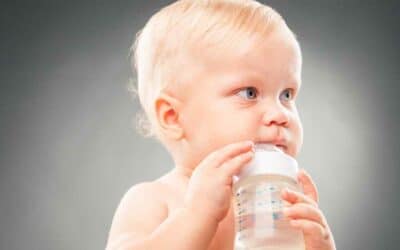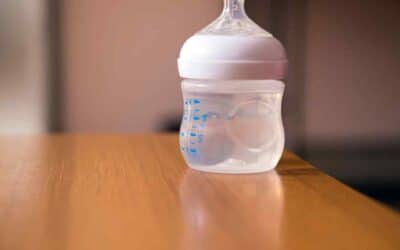As a new parent, you may have many questions about when and how to introduce water to your baby’s diet. After all, hydration is essential for your baby’s overall health and development, and ensuring that they are getting enough water is crucial for their growth and well-being.
But with so many different opinions and recommendations, it can take time to figure out where to start. That’s why we’ve created the ultimate guide to introducing water to your baby’s diet. This comprehensive guide will provide you with all the information you need to know, including the recommended age to introduce water, the benefits of giving your baby water, and tips for ensuring your baby stays hydrated.
So, whether you are a new parent or an experienced caregiver, this guide has everything you need to know to ensure your baby gets the hydration they need to thrive.

Water Benefits on Your Baby’s Diet
Giving your baby enough fluids have many benefits for their health and development. First and foremost, it helps to keep them hydrated, which is essential for their overall health and development.
Water is also vital for maintaining body temperature, supporting digestion, and preventing constipation. It also may help to prevent tooth decay, as sipping on water throughout the day can help to wash away sugar and bacteria.
Giving your baby water also helps to prepare them for drinking other liquids, such as breastmilk or formula, and can make it easier for them to transition to solid foods.
Furthermore, providing water is also a great way to ensure your baby gets adequate fluids and doesn’t get dehydrated, especially in hot weather.
It’s important to note that newborns don’t need water and breast milk, or formula is sufficient to provide hydration until they start solid foods. But you can start introducing small amounts of water to your baby’s diet once they begin to eat solid foods and once they reach 6 months old.
The Different Types of Water for Baby’s Diet
There are many different types of water, each with its own characteristics and benefits.
Tap water
Tap water, also known as municipal water, is supplied to homes and buildings through a system of pipes and pumps by a public utility. It is treated with various methods, such as filtration, chlorination, and fluoridation, to ensure it is safe to drink and meets the quality standards set by the government.
Tap water is a cost-effective and convenient way to provide clean and safe drinking water to homes, buildings, and communities. It is regularly tested and monitored to meet quality and safety standards.
In addition, tap water has fewer environmental impacts than bottled water, as it does not require using natural resources and energy to produce and transport plastic bottles.
Distilled Water
Distilled water is water that has been purified through a process called distillation. This process involves heating the water to its boiling point, causing it to turn into steam, which is then captured and cooled, turning it back into a liquid.
The impurities and minerals in the original water are left behind during the distillation process, resulting in water free of dissolved solids, bacteria, and other contaminants. This makes distilled water ideal for specific applications such as battery refills, irons, and humidifiers that minerals and impurities can damage.
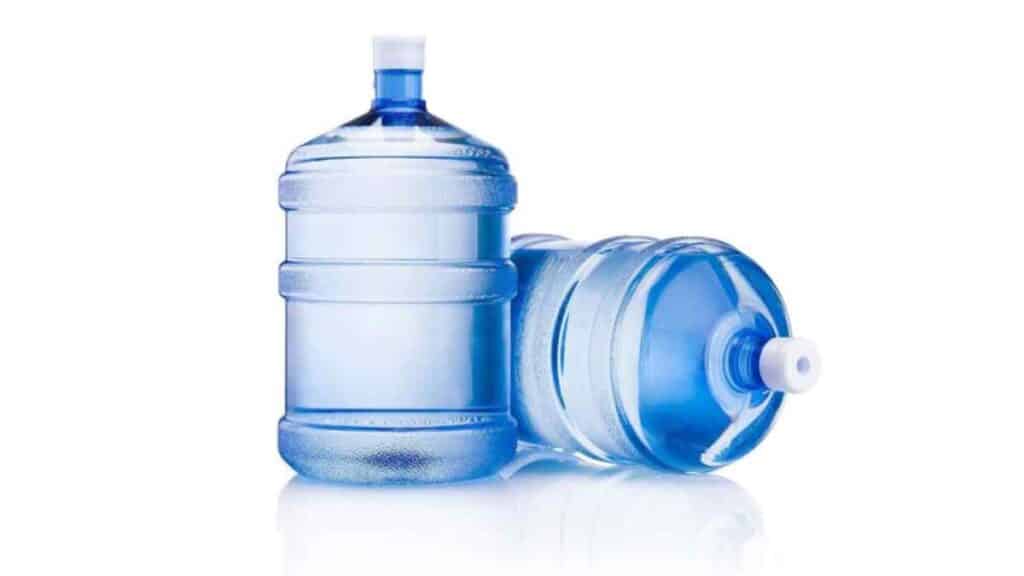
Purified water
Purified water is water that has been processed to remove impurities, including bacteria, viruses, and dissolved solids. Several methods are used to purify water, including reverse osmosis, distillation, and deionization.
Reverse osmosis uses a semipermeable membrane to filter out impurities, while distillation heats water to produce steam, which is then condensed and collected as purified water.
Deionization uses ion exchange resin to remove charged particles from water, such as ions of minerals and metals. Purified water is often used in industrial settings, such as in power plants and pharmaceutical manufacturing, as well as in laboratories and for medical procedures. It is also used as the base ingredient for making drinking water, baby’s diet food, and even in cosmetics and personal care products.
Filtered water
Filtered water is water that has been passed through a filter to remove impurities and contaminants. Various water filters are available, each using different methods to purify the water.
Some common types include activated carbon filters, reverse osmosis, and ceramic filters. These filters can remove a wide range of contaminants, such as sediment, bacteria, and heavy metals, as well as bad taste, odor, and certain chemicals.
Filtered water is a popular option for households, as it is generally considered safer and healthier to drink than tap water and may taste better. It is also more environmentally friendly than buying bottled water, as it can be filtered and reused multiple times. Filtering your water at home can also save money in the long run, as opposed to buying bottled water.
Well water
Well water is water obtained from a hole drilled in the ground to access underground water sources, such as aquifers. Well water can be used for various purposes, including drinking, irrigation, and industrial use.
It is a common source of water in rural areas, where public water systems may not be available. The quality of well water can vary depending on factors such as the well’s location and the area’s geology. It can be contaminated with bacteria, viruses, pesticides, heavy metals, and other pollutants if the well is not properly maintained or if nearby industrial or agricultural activities contaminate the aquifer.
Therefore, it is crucial for well water to be tested regularly and treated as needed to remove impurities and ensure it is safe to drink. Homeowners with private wells are responsible for maintaining and testing their wells and water supply.
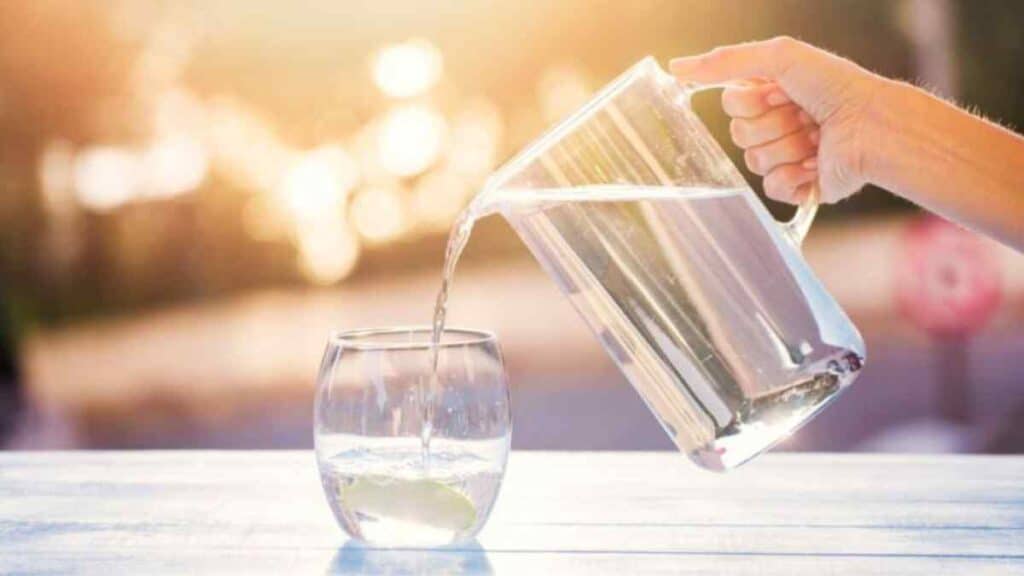
What Kind of Water Should I Use in My Baby’s Diet?
When deciding what kind of water to give your baby, it’s essential to consider the source and quality of the water. The best option for babies is to provide them with clean and safe drinking water that meets the standards set by the government.
Purified Water and Distilled Water are safe for babies to drink because they have been treated to remove impurities, such as bacteria, sediment, and heavy metals, that can harm their health.
The purification process used to make purified water, such as reverse osmosis or activated carbon filtration, removes contaminants that can be present in tap water, making it a safe option for babies. Distilled water is also safe for babies because of the process makes it of distillation which removes impurities and minerals found in water sources.
Additionally, purified and distilled water are free from chlorine, fluoride, and other chemicals used in the treatment of municipal water supply. Also, if you have concerns about Lead or other heavy metals in the water, distillation and reverse osmosis filtration can effectively remove them.
Thus, you can only give distilled water and purified water to babies. But, if you don’t have access to these types of water, boil any water source you have first.
Here are the general steps for boiling water for a baby:
- Fill a pot or kettle with the desired amount of water.
- Place the pot or kettle on the stove and turn the heat to high.
- Wait for the water to come to a rolling boil. This means that there are large bubbles continuously rising to the surface.
- Once the water reaches a rolling boil, let it boil for an additional minute.
- Remove the pot or kettle from the heat and let it sit for a minute to cool slightly.
- Fill a baby bottle or container with cooled boiled water.
- If preparing the formula, check the package instructions for the recommended amount of water to use and the recommended water temperature.
- Once you have the water at a suitable temperature, you can use it for mixing formula or other purposes as needed for the baby.
It is important to remember that not all types of bottles and containers can handle hot liquids, so be sure to use one designed for this purpose and never leave hot water unattended. Also, always check the water temperature before giving it to your baby to avoid burns. If you want to ensure the water is at the right temperature, you can use a thermometer or pour a small amount of water onto the inside of your wrist, which should feel lukewarm.
When Is It Safe for Babies to Drink Water?
Babies under 6 months old do not need to drink water in addition to breast milk or formula. Breast milk or formula provides all the hydration that a newborn baby needs. Introducing water to babies younger than 6 months old can even be harmful and decrease the amount of breast milk or formula consumed, which could lead to dehydration or malnutrition.
After 6 months of age, it’s safe to start introducing water to your baby. However, it’s important to remember that breast milk or formula should still be the main source of nutrition until at least 12 months of age.
It’s always a good idea to consult with your baby’s pediatrician before introducing water or any solid food to your baby. They can guide the appropriate timing and amounts of water based on your baby’s diet needs and development.
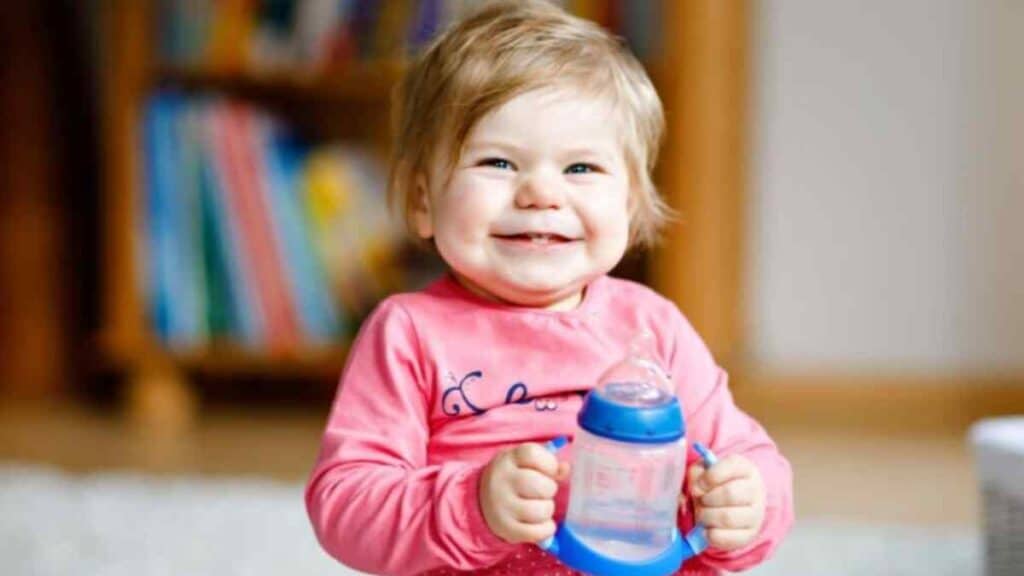
How Much Water Should a Baby Drink?
The amount of water a baby should drink can vary depending on age, size, and overall health. For babies over 6 months of age, it’s safe to introduce small amounts of water, about 2-4 ounces per day, in addition to their regular milk or formula intake.
As a child grows and develop, their water intake needs will increase. The American Academy of Pediatrics recommends that babies between 6 and 12 months of age consume at least 4 to 8 ounces of water daily. Toddlers between 1 and 3 years should drink 8 to 12 ounces of water, and Children 4 to 8 years old should drink 5 to 8 cups of water per day.
It’s worth noting that these are general guidelines, and you should always consult with your baby’s pediatrician regarding your baby’s specific water needs and any other questions or concerns about hydration and nutrition.
Remember: Giving a baby too much water can cause the cells in the body to swell, which can be particularly dangerous for the brain. Symptoms of water intoxication in babies can include excessive urination, diarrhea, vomiting, seizures, and in severe cases, coma or even death.
If you suspect your baby may have consumed too much water, it’s essential to seek medical attention immediately, as it can be life-threatening.
How to Introduce Water to Your Baby’s Diet
Introducing water to your baby’s diet can be a gradual process. It’s recommended to wait until your baby is at least 6 months old before introducing water. At this age, many babies are developmentally ready to handle the coordination of drinking from a cup.
One way to introduce water is to offer it in small amounts, using a cup or a sippy cup. You can start offering a few sips of water from an open cup and gradually increase the amount as your baby gets more accustomed to drinking from a cup. It’s also important to note that babies may only be interested in drinking water after some time, so it’s important to be patient and persistent with the introduction.
When introducing water, it is a good idea to offer it at mealtimes when the baby is already accustomed to sitting and drinking or eating something.
Also, add a flavor to the water, like a few drops of fruit juice, to make it more appealing to your baby. It’s also advisable to check with the pediatrician before introducing any new food or drink and to follow their guidance.
Common Questions and Concerns About Giving Babies Water
Here are some answers to common concerns about giving babies water.
- How much water should I give my baby?
Answer: The amount of water given to a baby varies based on the baby’s needs and age.
- At what age should I start giving my baby water?
Answer: It is generally recommended to wait until your baby is 6 months old before introducing water.
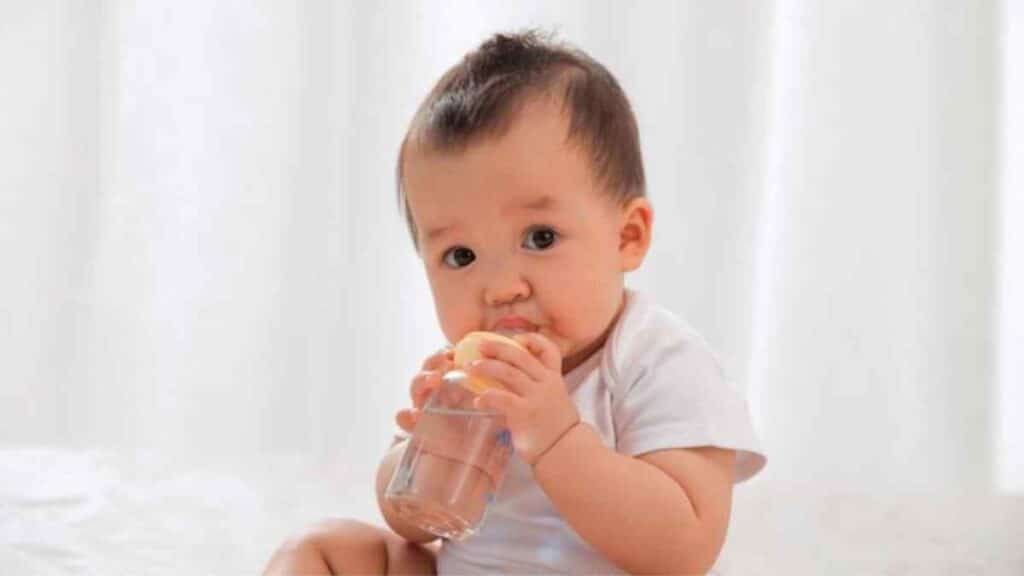
- Can giving my baby too much water be dangerous?
Answer: Yes, giving a baby too much water can be hazardous as it can lead to water intoxication, electrolyte imbalance, or hyponatremia.
- How can I tell if my baby is getting enough water?
Answer: Signs of a baby getting enough water include wet diapers, normal urine color, and consistent bowel movements.
- Can giving my baby water help with constipation?
Answer: Drinking water can help with constipation, but it should not be the only method used to treat constipation in babies.
- Should I give my baby water in addition to breast milk or formula?
Answer: For babies under 6 months old, breastmilk or formula should be the main source of nutrition and hydration. After 6 months, as solid foods are introduced, you may introduce water in small amounts. However, breastmilk or formula should still be the main source of nutrition until at least 12 months of age.
- Can I give my baby flavored water or water with added vitamins?
Answer: It is generally not recommended to give babies flavored water or water with added vitamins, as it can contain added sugars and other ingredients that may not be appropriate for a baby’s diet.
- What are the signs of water intoxication in a baby?
Answer: Signs of water intoxication in a baby include excessive urination, diarrhea, vomiting, seizures, and in severe cases, coma or even death. If you suspect your baby may have consumed too much water, it’s important to seek medical attention immediately.
- Can my baby drink too little water?
Answer: Yes, a baby can also drink too little water, which can cause dehydration
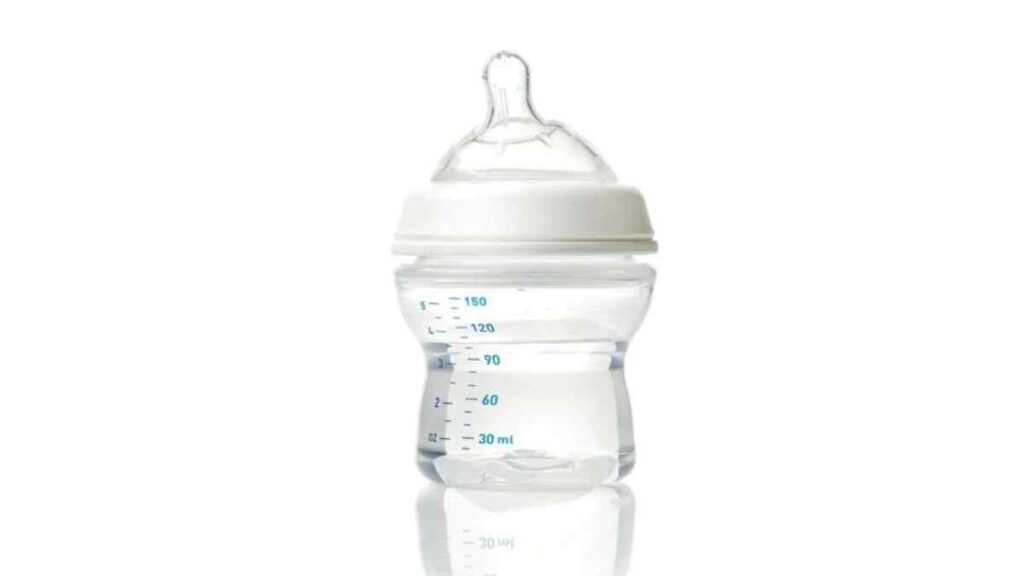
Takeaway
In conclusion, introducing water to your baby’s diet is essential to their nutrition and development. Knowing when and how to start, what to look for, and tips for success are vital to ensuring your baby gets the hydration they need to thrive.
Water is essential for hydration, which helps keep your baby’s skin healthy and digestion regular. It also helps with their cognitive function and overall energy levels. However, it’s important to choose the right kind of water and be mindful of the amount you offer to your baby. Distilled water and purified water are considered safe options.
Consult your pediatrician to determine your baby’s best water source and amount. By following this guide, you will be well on your way to ensuring that your baby is getting the hydration they need to grow and develop.
If you found this article helpful, please share it with your friends and family. We’d also love to hear your thoughts in the comments below!

